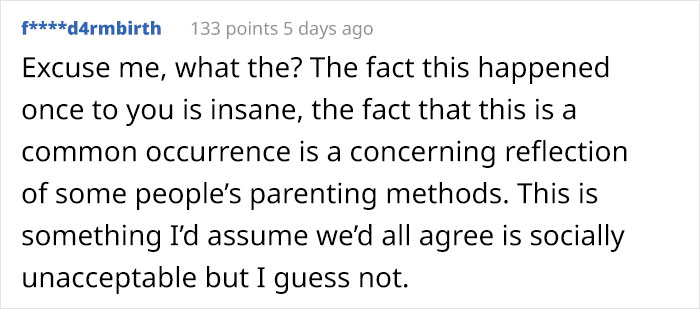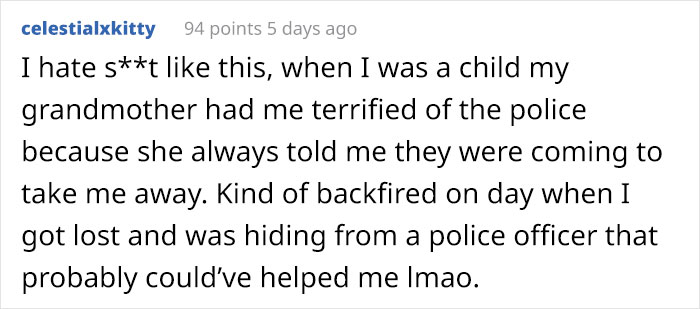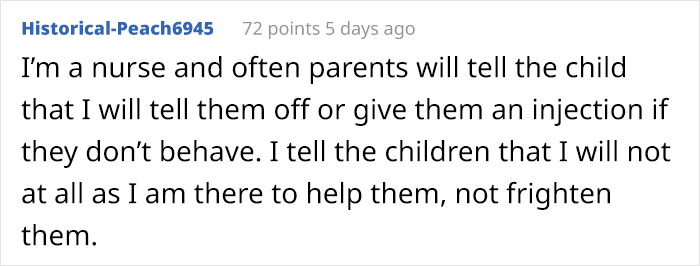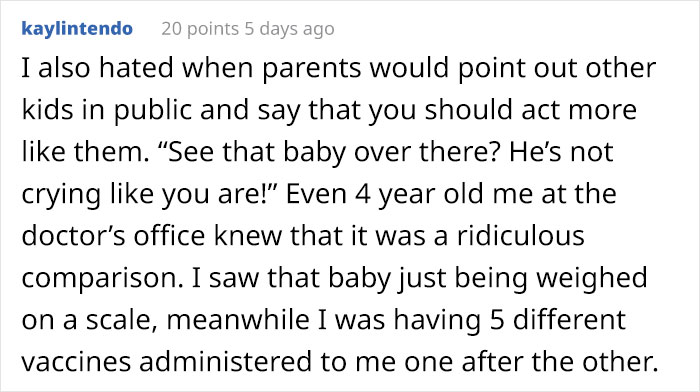Being kind to strangers sounds like a no-brainer. However, you’d be surprised by how rude and callous some people can be to folks they don’t personally know. Unfortunately, instead of setting clear expectations for behavior in public upfront, some parents use bigger people to put their misbehaving kids in place.
Redditor u/A_Nameless, who is 6’3″ (190.5 centimeters) tall and weighs 230 pounds (104 kilograms), recently went viral on r/TrueOffMyChest after sharing how people use his size to scare their kids. It’s something that definitely isn’t okay. Read on for the full story and the internet’s reactions. Bored Panda reached out to the author of the viral story, and he was kind enough to share his thoughts with us on good parenting. You’ll find our interview with u/A_Nameless as you scroll down.
Some parents choose to frighten their children into behaving ‘properly’

One man recently vented online about how he’s chosen as a negative example for folks to scare their kids
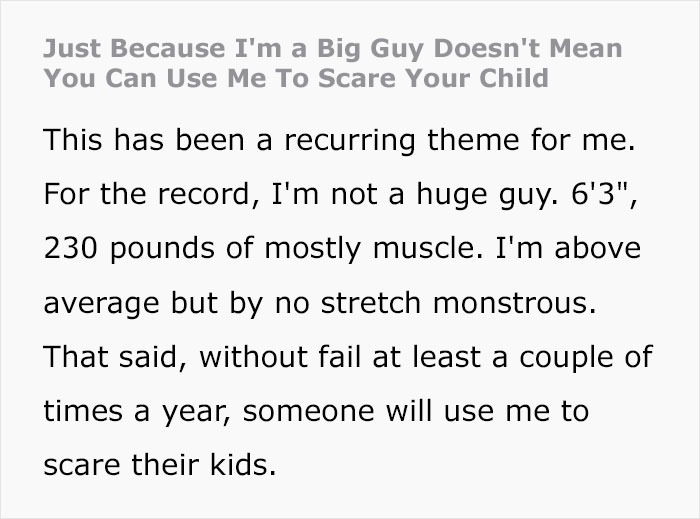
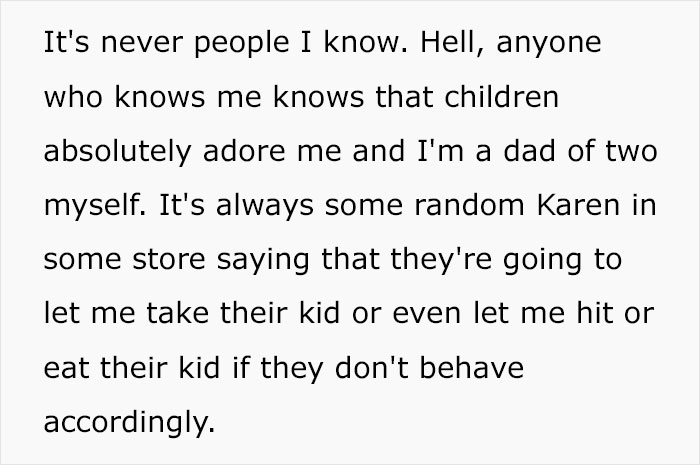


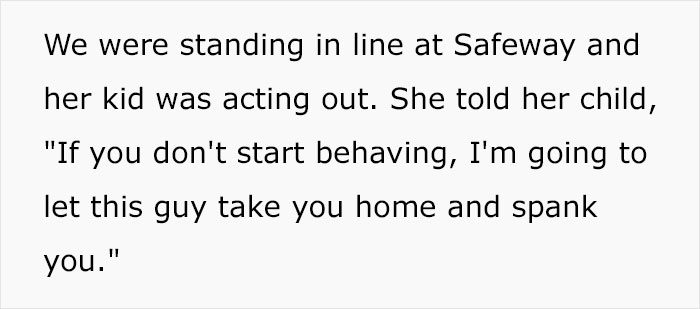
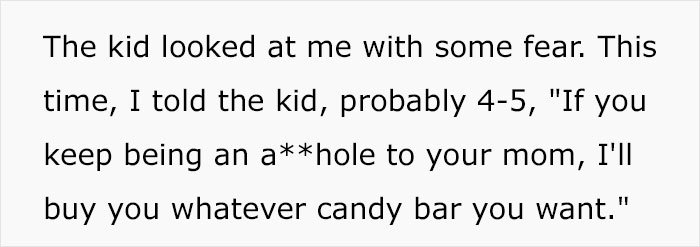
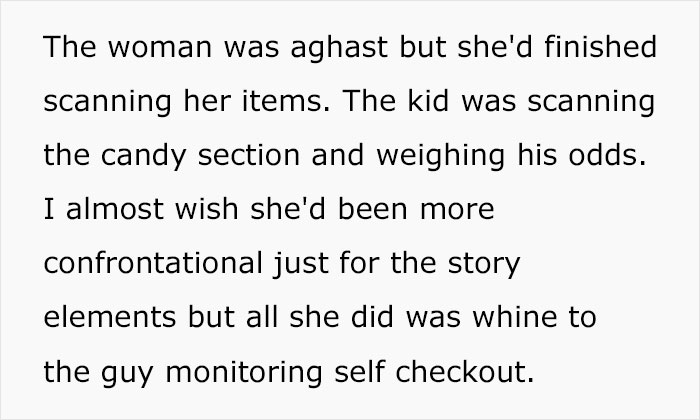
Scaring your kids with random strangers is the wrong way to go about parenting, but it happens quite often

Image credits: Caleb Woods / unsplash (not the actual photo)
We wanted to get the author’s opinion on why so many parents seem to think that it’s okay to use strangers as negative examples to scare their children. “I think that, at the end of the day, most of us on some level want to be a friend to our child. As such, it’s hard to be the bearer of bad news,” u/A_Nameless told Bored Panda.
“Now sure, there’s situations in which virtually all parents tend to own up and realize that it’s their responsibility but with a non-negligible number of people, there’s a very real awareness of the fact that, if we can make someone else the bad guy, why not? I think that’s very much the same reason that we often wait for a kid with a chip on his shoulder and a mission to tell our kids about Santa as they grow up instead of telling them ourselves,” he shared his take on things.
We were curious what the right response would be if someone were to be used as a negative example for some stranger’s kids. Redditor u/A_Nameless said that the right thing to do “is to own it.”
“The thing about using a stranger as your big bad guy is that you are seldom going to run into the same stranger twice so you’re re-establishing a new bad guy each time all while helping foment a general distrust for society as a whole in the process,” he said.
“Your child is going to be much more responsive to knowing that they’re disappointing someone who, while may be their own antagonist in the existing scenario, is a permanent fixture in their life.”
Pointing to a stranger in public and then using them as a ‘negative’ example to scare your kids is a very cheap way to get them to behave. It effectively boils down to using fear to get a quick response, instead of communicating about the misbehavior in the first place.
Research shows that authoritative parenting is most likely the healthiest approach to raising children. It’s the perfect blend of firmness, openness, love, and support. Authoritative parents work to set healthy boundaries for their children’s behavior; however, they make the rules and expectations incredibly clear. They’re assertive but calm, disciplined but loving, open and fair.
With that transparency in mind, they also communicate with their kids about why some rules have to exist and why some behaviors will have bad consequences. These parents aim to take their kids’ thoughts and feelings into account, without giving into their whims.
Children raised in authoritative households grow up responsible, happy, and successful, as well as comfortable expressing their thoughts, standing up for themselves, and making sound decisions.
How parents react to their kids’ behavior in public reveals a lot about their values priorities

Image credits: Jordan Whitt / unsplash (not the actual photo)
If your kid is misbehaving in a public setting, like a grocery store, how you handle the situation will say a lot about your parenting strategy. There are 4 main ones.
For example, neglectful parents might ignore the tantrum altogether, unconcerned about what’s going on. Permissive parents might let their kids misbehave because “kids will be kids,” or they might give in to the tantrum and try to win them over with sweets or gifts or other promises.
Authoritarian parents would likely be harsh and yell, subtly threaten, or simply drag their kids out of the store. They might even point to some random person who looks vaguely ‘threatening’ and use them to scare them.
Authoritative parents, however, would see the situation as a learning opportunity. They would talk to their child about what’s happening, how their behavior is affecting others, and explain the consequences that would follow if they don’t stop their tantrum. It’s this willingness to communicate in uncomfortable situations that makes all the difference.
It’s best to communicate with your child and set clear expectations upfront

Image credits: Kindel Media / pexels (not the actual photo)
Verywell Family suggests that parents make certain expectations clear for their kids before they all leave their homes and head into a public setting. That means explaining that there shouldn’t be any reckless running or random screaming, that they shouldn’t touch random items for sale, that they should hold your hand when crossing the street, etc.
What sounds common sense to us, adults, may not be that for kids. They need explicit instructions beforehand. They also need to be aware of the consequences that their (mis)behavior will have.
It’s incredibly useful that you explain why these rules are necessary and why the consequences that you’ve outlined will occur. Having no rules at all would likely lead to chaos in public. Meanwhile, not explaining the rules might leave the children confused and resentful.
As Verywell Family points out, “Kids do better when they know exactly what to expect and what’s expected of them.” On the flip side, they tend to have a lot of difficulty dealing with surprises.
Bored Panda asked the OP about the healthy way for parents to react when their children misbehave. The redditor told us that it’s best to be proactive in these sorts of situations. “Help your kid better manage their feelings in advance so that they can monitor their own feelings.” However, in reality, this is easier said than done.
“I think the most appropriate reaction at those boiling points in which it can’t be contained by forethought is disappointment,” u/A_Nameless said that he’s personally met with a number of child psychologists who have explained how disappointment is a far better reaction than anger or aggression.
“First off, it [disappointment] is a much better-moderated emotion. It’s one that can be conveyed without lashing out or contributing to a scene yourselves. This helps on multiple levels in that the child will often match your energy to at least some degree if you’re adequate at it and also, at the end of the day, there is a societal and damn-near intrinsic need to please our parents,” the OP shared with us.
“I know that it was a running joke in virtually every media format for some years that the words, ‘I’m not mad, I’m just disappointed’ were considerably more damning than any lashing out might be.”
Many readers wanted to share their reactions, as well as similar stories


